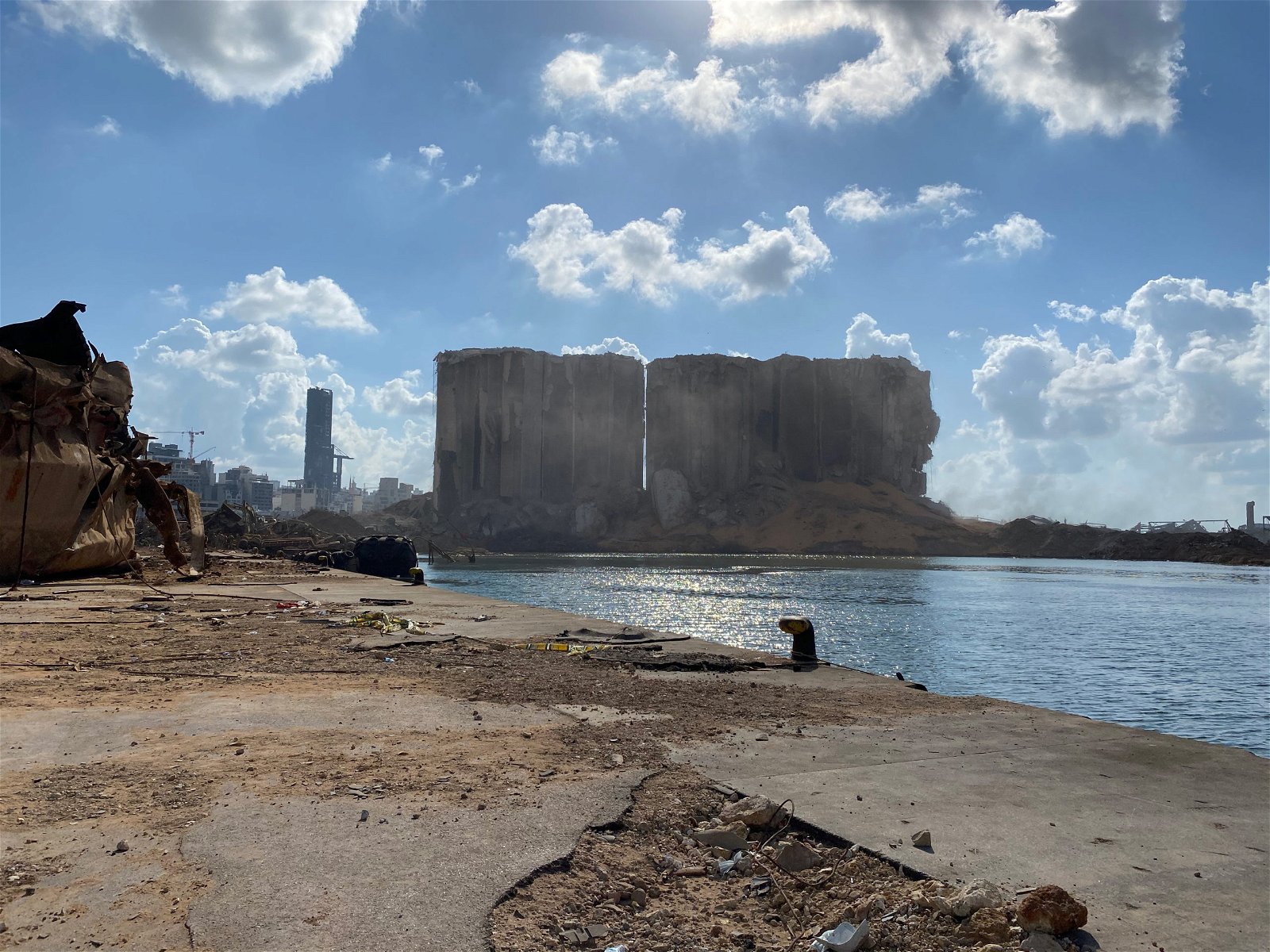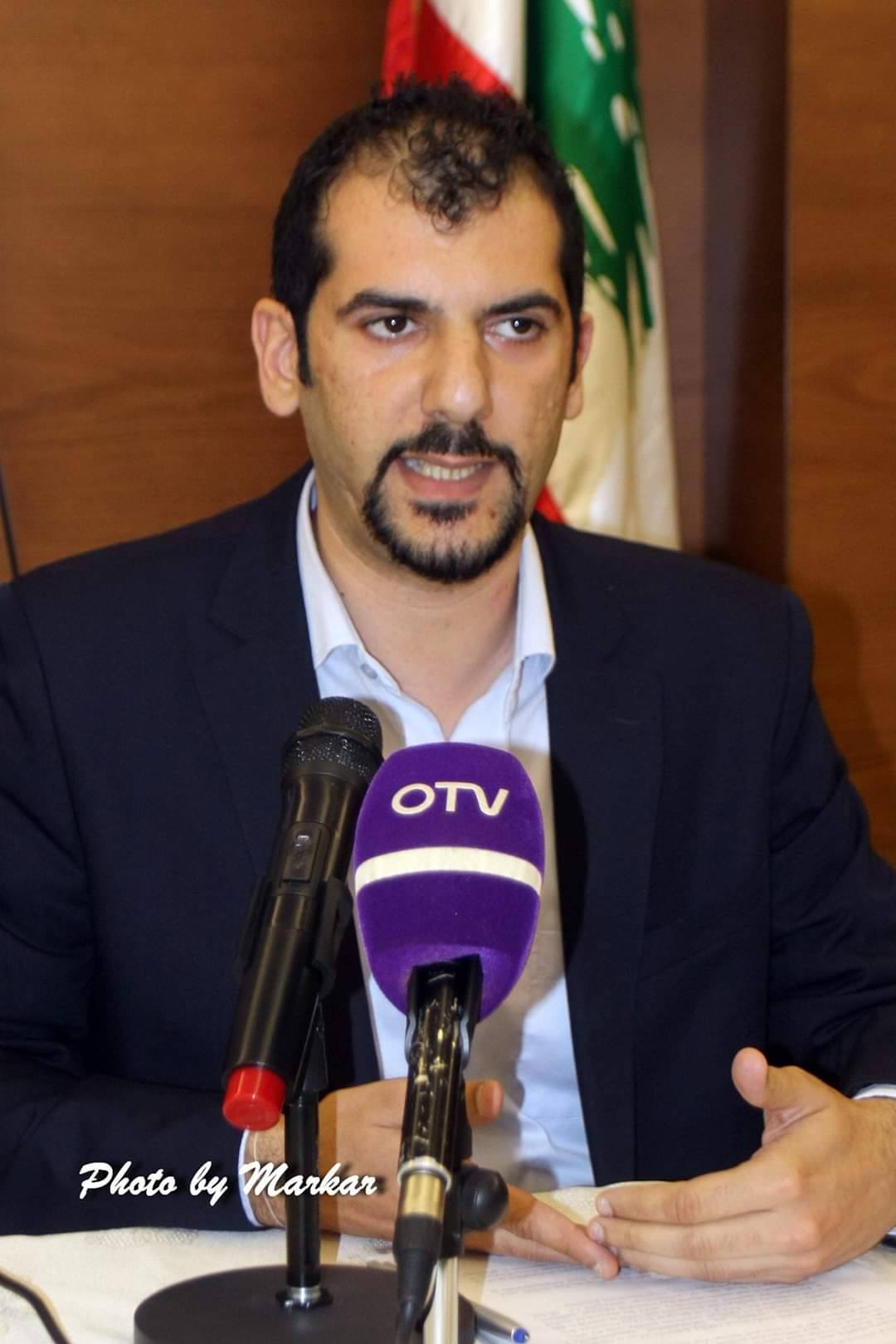
On August 4, 2020 at around 6PM local time, a huge chemical explosion shook Beirut and its surrounding cities. The Port of Beirut was no more. But the destruction was not limited to the Port; the areas surrounding the explosion site along the famous cosmopolitan Armenia Street, populated by Armenians and other Christians sects, from Mar Mekhael to New Hadjen, Bourj Hammoud and Achrafieh were heavily damaged. Bars, restaurants, shops, industries and residential areas were completely or partially damaged. As a result, more than 200 people died and around 7,500 people were injured. The man-made tragedy severely shook the Armenian community, which lost its industrial and middle-class business heart.
Varanta Yacoubian was a victim of the Beirut blast. She was in Mar Mikhael, close to the Port, studying inside a coffeehouse. She was injured, barely escaped and is still traumatized like thousands of Lebanese.
Hrag Avedanian was working when the Beirut blast happened. For a moment, he thought he was living in a war zone. To get home, he walked his daily route through downtown, Gouraud and Armenia streets. “The buzzing streets once known for their historical buildings, exhibition centers, bars and restaurants were no more. I still recall images from the scenes I saw that night. It was the most difficult walk I’ve ever done. It was a horror movie. Utter destruction. Blood. Screams. Cries. Ambulances. Military convoys. Confused citizens. Search and rescues. Sirens and alarms. Lots and lots of sirens,” recalled Avedanian.
Avedanian was one of the young people who immediately volunteered. The next day, hundreds of volunteers took to the streets to help clean homes, shops, sidewalks and make room for cars to pass. With a team of experts, he helped launch “Together for Lebanon – TFL 2020.” They were able to fundraise around $100,000 to fix doors, windows and glasses to make homes safe again. The team also partnered with a local socio-medical center to provide free medical assistance and home visits to the victims of the blast. Avedanian remembers his first visit to the Armenian Apostolic Church of Surp Hagop in Achrafieh after the blast. It was such an overwhelming and emotional experience for him. Prayers were being sung in a structure with no doors or windows. Local Armenians in face masks were sitting on what was left of the pews, holding back their tears as the church sings “Der Voghormia” [Lord have mercy].
The industrial and business sectors of Armenian populated areas of Beirut were hit hard by the financial crisis and the explosion. Many Armenian families started to emigrate, shrinking the middle-class. To address the needs of the community, each Armenian Revolutionary Federation (ARF) committee local center became a social welfare center. The committees started distributing hot meals, medical and financial needs to needy families. Thanks to the ARF’s large international family, fundraisers were organized in the US, Europe and Australia to send money. On August 12, the Lebanese-Armenian Rehabilitation Commission was also established to assess, compensate and rebuild. The commission aimed to recover and facilitate the rehabilitation of the Armenians. It consisted of representatives from the Armenian Apostolic, Catholic and Evangelical communities, as well as Armenian political parties and humanitarian organizations. It is being operated under the leadership of the Catholicosate. As such, a group of engineers visited the damaged areas and assessed Armenian-owned properties. Almost three-thousand houses and 1,500 businesses and shops were damaged.
The community leadership, often led by the ARF, did its best to mobilize local and party resources to support needy Armenian families suffering from the COVID-19 pandemic and the ongoing financial crisis. To fight the pandemic and mobilize the community, the Central Committee of the ARF met with Armenian social and health institutions and established the Coronavirus Crisis Committee Lebanon in late February 2020. The main task of the committee was to raise awareness on social media about the dangers of the pandemic and help the infected Armenians. Soon, there was coordination between all the political parties, AGBU, organizations, churches and the Coronavirus Crisis Committee Lebanon, where thanks to their efforts, many Armenians entered public hospitals free of charge. The committee distributed face masks and anti-bacterial cleaning packages, and Armenian neighborhoods and institutions were cleaned and disinfected on a weekly basis. Soon, health clinics were opened in Armenian community centers. The committee also provided free housing to Armenian medical staff working in the hospital. Unfortunately, one of the cofounders of the committee, Dr. Sahak Keshishian, who was helping infected community members, died fighting COVID-19. More than seven thousand PCR tests were conducted in Armenian neighborhoods free of charge. The committee was influential in mobilizing the youth and doctors to help needy elderly families.
Still, Lebanon keeps sinking. Major investors and politicians started transferring their money outside the country. As a result, the subsequent dollar shortage further affected the economy; as import businesses and citizens became unable to acquire US dollars at the official rate, a black market emerged. The US dollar, which was equivalent to around 1,500 Lebanese Lira (official rate), is now valued at around 23,500 LL in the black market. In addition to hyperinflation, unemployment and the rise of poverty, there is a grave shortage in electricity supplies, medicine, fuel oil and gas. Lebanese are literally on the edge of starvation.
Lebanon is enduring a severe and prolonged economic depression. The World Bank has estimated that the country’s GDP contracted by 20.3 percent in 2020. As conditions in the financial sector continue to deteriorate, the World Bank Lebanon Economic Monitor in June reported that the economic and financial crisis is likely to rank in the top 10, possibly top three, most severe crisis episodes globally since the mid-nineteenth century. The report also mentioned that poverty would exceed 50 percent. The poor and the lower-middle class are in urgent need of pecuniary support. Moreover, the inability and the absence of a fully functioning executive authority will further threaten the dire socio-economic conditions and the fragile social peace with no clear turning point on the horizon.
To add more humiliation to this miserable situation, Lebanese are waiting for hours in front of gas stations to fuel their cars, fighting over a piece of bread or milk or begging the pharmacist to provide them with medicine and powdered milk for their children. New college graduates, doctors and professors are leaving the country; the traditional middle class is evaporating.
The Armenian community is also shrinking and its political, economic and physical existence is dependent on the new political-economic system emerging in Lebanon. However, will the community survive until then? Will the traditional middle-class, which was the backbone of communitarianism, completely disappear? Will individualism, the survival of the individual, replace communitarianism, the main dynamo pushing for group-working and grassroots mobilization? Answering these questions is painful, but it is clear that the dynamic Lebanese-Armenian community, once known as the heart of the Armenian Diaspora, is giving its last breath, waiting for a miracle to save Lebanon.
The youth are already hopeless. Some are emigrating and not so optimistic about the future of the country. Yacoubian, like most Lebanese, asks whether there will be accountability and justice. Despite the fact that she is not optimistic about Lebanon’s future, she insists the youth must keep fighting until justice is served and the perpetrators of the blast are held accountable. Avedanian, too, is not optimistic about the future of Lebanon. He argues that the damage Beirut witnessed is beyond one’s ability to comprehend or explain. Everyone lost a part of their heart. Everyone died a little. “This is a failed state,” he added. “We are not ruled by governments or parliaments but rather by a network of corrupt elites using non-existing public funds to fund their clientelistic networks, buying loyalties and growing their personal wealth. One year on and there is not one pinch of justice.”
A year has passed, and a traumatized nation is still waiting for justice.



The Lebanese Army is still in one piece, though weak and useless in protecting Lebanon against Iran and ‘Hezbollah. However it is organized and could interface with the Israeli military, to transfer to hard hit communities very much needed help. I am confident the Israelis would assist.
A heart-wrenching, superbly presented cri de coeur. Viva Lebanon and all of its various sectors and population centers. I wish I could provide some — any measure — of succor. I did notice “China” above…I have a dream that China might invest (further) in the Middle East, especially at this point toward assisting and rebuilding Lebanon, and around the world and provide further evidence of its burgeoning power and good works…that, IMO, far exceed the belligerence and “military option” and “no diplomacy” stances of my United States of America.
Viva al-Lubnaan! — its people, its land, its future!
I have noticed that most or almost all reports on Lebanon’s plight in the international media avoid mentioning the elephant in the room, the direct culprit in last year’s port explosion. That is Hizbullah. The Americans and French must know who is the direct culprit. But they will not blame the Hizb. And for that reason, all of Macron’s ostensibly helpful plans and suggestions are worthless. He wants the political class to make reforms, to take action to do this or that. But the Hizb holds a pistol to everyone’s head who might threaten their chokehold on the country. Yet Macron talks his silly gab as if Lebanon could pull itself out of the Hizb’s bear hug or chokehold all by itself. Western press commentators point to the confessional as the big problem to be gotten out of the way. But the Hizb would not allow that unless it could retain its control. Aoun too knows what his limits are. Last year, after the blast, he must have thought that he could do something to improve the economy while the Hizb seemed to be disoriented. His daughter spoke of some kind of modus vivendi with Israel. He himself agreed with US diplomats to try to reach an accord with Israel on a maritime border so that Lebanon could lease offshore zones for oil and gas drilling, and thus get payments and a cash flow from oil & gas companies. Unfortunately, the Hizb soon shot down the ensuing negotiations. But will Paris or Washington ever acknowledge the truth that the Hizb is an obstacle to Lebanon’s recovery? And then take appropriate actions?